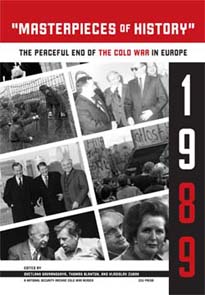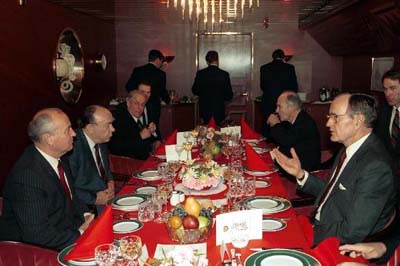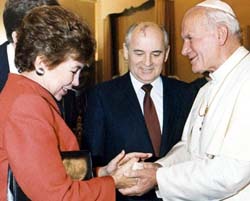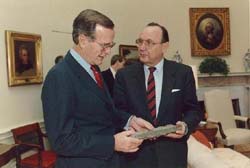Copied extant from original site linked in title above
Previously Secret Documents from Soviet
and U.S. Files on the 1989 Meeting, 20 Years Later
Edited by Svetlana Savranskaya and Thomas Blanton
|
|
The posting also includes the transcript of Gorbachev's historic meeting before Malta with Pope John Paul II at the Vatican, featuring remarkable agreement on values and the "common European home," including the Polish pontiff's statement that "Europe should breathe with two lungs." From the American side, the documents include the before-and-after National Security Council talking points prepared for Bush, the preparatory memos to Bush from Secretary of State James Baker and other top aides, intelligence briefings for Bush from the CIA and the State Department, and the Bush script and briefing book contents list for Malta itself – all obtained through the Freedom of Information Act.
The documents show profound misjudgments of Gorbachev on the American side, including the President's assumption that the Soviet leader would press for the removal of U.S. troops from Europe, not realizing until talking to Gorbachev directly that, just as Gorbachev had already announced publicly on multiple occasions, he believed the U.S. presence along with the NATO alliance to be a stabilizing force in Europe, particularly against any danger of German revanchism.
The documents signal a major missed opportunity at Malta to meet Soviet arms reductions proposals halfway, and suggest that the Bush "pause" in U.S.-Soviet relations during 1989 effectively delayed both strategic and tactical demilitarization for at least two years (the START treaty would not be signed until 1991, and only in September 1991 would Bush withdraw tactical nuclear weapons from U.S. Navy ships), at which point Gorbachev had effectively lost the domestic power to deliver on his side.
Gorbachev had sought to engage president-elect Bush as early as the Governor's Island meeting in New York in December 1988, but Bush demurred, instead launching a strategic review of U.S.-Soviet relations that cloaked the reality that the transition from Reagan to Bush was one from doves to hawks, that is, disbelievers in Gorbachev as a true reformer. Throughout 1989, judging by the candid memoir authored by President Bush with his national security adviser Brent Scowcroft (Note 1), the Bush mentality was marked by insecurity and anxiety that Gorbachev was more popular globally and had the initiative on proposing new departures in security policy – never quite recognizing that Gorbachev's proposals might well be in the U.S. national security interest. (Note 2)
Not until Bush went to Eastern Europe himself in July 1989, where he heard the reform Communists like Jaruzelski in Poland and Nemeth in Hungary plead with him to reach out to Gorbachev because that created political space for them to make change – and even more importantly, where he met the dissidents and oppositionists like Lech Walesa in Poland, who called U.S. aid proposals "pathetic," (Note 3) or Janos Kis in Hungary whom Bush quickly concluded should not be running his country – did Bush overrule his advisers and ask Gorbachev for a meeting, meaning to slow down the process of change in Eastern Europe. Bush wrote in his memoir: "I realized that to put off a meeting with Gorbachev was becoming dangerous. Too much was happening in the East – I had seen it myself – and if the superpowers did not begin to manage events [!], those very events could destabilize Eastern Europe and Soviet-American relations… I saw that the Eastern Europeans themselves would try to push matters as far as they could." (Note 4)
|
Gorbachev's own frustration with the Bush "pause" and review of policy made the Soviet leader more than eager for such a meeting; but between the July idea and the December reality, Eastern Europeans rushed in and took apart the Stalinist empire including the Berlin Wall. Originally intended as an "interim" meeting to prepare for a full-scale summit in 1990, the Bush-Gorbachev meeting at Malta would take on a life of its own, symbolically closing the Cold War. Stormy weather and raging seas in Malta would play havoc with the meeting planners' idea of alternating U.S. and Soviet ships as picturesque sites for the meetings – thus providing something of a metaphor for the rush of events in Eastern Europe that ran out of the control of both superpowers.
Going into the Malta summit, the Bush team was determined to do the opposite of what Ronald Reagan had so successfully achieved in relieving the Soviet sense of threat through substantive arms control discussions, including remarkable commitments to the abolition of nuclear weapons. Instead, as the NSC preparatory points make clear, Malta was meant to avoid any substantive discussion of arms control, and simply convey, as Secretary of State Baker wrote in his briefing memo on November 29, "a public sense, here and abroad, of a new pace and purpose to the U.S.-Soviet dialogue with you leading as much as Gorbachev" – public relations in place of substance. The briefing memo from arms negotiation advisor Gen. Edward Rowny described the START treaty as having "potential risks and few gains" and any reductions in naval weapons "all losers for us" – recommending that Bush should say up front that the "US Navy is not on the bargaining table."
Bush's briefing book for Malta betrays the administration's actual priorities – Eastern Europe and its revolutionary changes were way down the contents list, along with arms control. Pride of place was Central America, where Bush's right flank in domestic politics believed Castro was the devil, the Nicaraguan Sandinistas were a Communist beachhead pointed at Texas, and Gorbachev himself was merely a new glove around the iron fist. In the Malta discussions, the Soviet leader called the American presumptions laughable: "It is not quite clear to us what you want from Nicaragua. There is political pluralism in that country, there are more parties than in the United States. And the Sandinistas – what kind of Marxists are they? This is laughable. Where are the roots of the problem? At the core are economic and social issues." Likewise on Cuba: "The issue now is how to improve the current situation. There is a simple and well-proven method: one has to speak directly to Castro. You must learn: nobody can lord it over Castro."
Malta's most significant outcome would simply be the reassurance it provided to the two leaders through a face-to-face meeting, and the building of a personal relationship on which both would rely in the difficult next two years. Gorbachev, for example, told Bush: "First and foremost, the new U.S. president must know that the Soviet Union will not under any circumstances initiate a war. This is so important that I wanted to repeat the announcement to you personally. Moreover, the USSR is prepared to cease considering the U.S. as an enemy and announce this openly."
Gorbachev also made an impact on Bush in the discussion of values. He bristled at Bush's repeated reference to "Western values" (a phrase found throughout the U.S. briefing materials for Malta) and argued that the U.S. approach of "exporting ‘Western values'" would cause "ideological confrontations [to] flare up again" in "propaganda battles" with "no point." Just before Malta, Gorbachev had found agreement on this point with Pope John Paul II, when the two of them discussed "universal human values" and the Pope commented, "it would be wrong for someone to claim that changes in Europe and the world should follow the Western model." Even though Bush told Helmut Kohl on December 3 that Gorbachev did not understand Western values, the American president subsequently adopted Gorbachev's phrasing, saying in his Brussels remarks immediately after the summit that the need to end the division of Europe was in accord with "values that are becoming universal ideals."
After Malta, the Americans raced to catch up with the arms control opportunities on offer from Gorbachev. NSC aide Condoleezza Rice wrote the preparatory memo for the NSC meeting on December 5, 1989, saying "The President has now committed himself to an ambitious arms control agenda before the June 1990 summit" and "the bureaucracy must not get in the way of the completion of the treaties" – yet the START deal would not be done until 1991 because of recalcitrance from Defense Secretary Dick Cheney and the U.S. Navy over on-site verification (the Soviets were willing to be more open than the American sailors) and cherished weapons like submarine-launched cruise missiles (in a classic contradiction between actual national security interest and the parochial interest of the military service involved, the U.S. had far more coastal metropolises that could be threatened with these weapons than the Soviet Union did).
Documents
Department of State, U.S. Embassy Moscow, "Preparing for Malta: Trade Policy Toward the USSR," [cable from Ambassador Jack Matlock], November 14, 1989
Department of State. Information Memorandum to Secretary Baker from Douglas P. Mulholland (INR). "Regional Issues at Malta: Gorbachev's Agenda." November 17, 1989
Department of State. Information Memorandum to Secretary Baker from Gen. Edward L. Rowny [Special Adviser for Arms Control]. November 17, 1989
National Intelligence Estimate 11-18-89. The Soviet System in Crisis: Prospects for the Next Two Years
Department of State. Information Memorandum to Secretary Baker from Douglas P. Mulholland (INR). "Soviet Thinking on the Eve of Malta." November 29, 1989
Department of State. Memorandum for The President from Secretary of State James Baker. "Your December Meeting With Gorbachev." November 29, 1989
The White House. Memorandum to The President from National Security Adviser Brent Scowcroft. "National Security Council Meeting, November 30, 1989." [With attachments: Agenda, Points to be Made, List of Participants]
Transcript of Gorbachev-John Paul II Meeting, Vatican City, December 1, 1989 [Transcribed notes by Aleksandr Yakovlev.]
The President's Meetings with Soviet President Gorbachev, December 2-3, 1989, Malta [Briefing Book for the President]. Excerpts (contents pages, selected released pages). Source: George H.W. Bush Library, FOIA request 99-0273-F
Transcript of the Malta Meeting, December 2-3, 1989. Source: Gorbachev Foundation, Fond 1, Opis 1
The transcript shows little trace of the fierce winter storm that disrupted the planned back-and-forth between U.S. and Soviet ships as the meeting venues at Malta, but instead demonstrates the growth of personal reassurance between the American and Soviet leaders, along with a few tempests over issues like "Western values" (see discussion above) and American pressures on Central America. Interestingly, in an extended discussion with Baker and Shevardnadze, the two sides approach agreement on a negotiation to end the protracted war in Afghanistan, where the Soviets had already completed their withdrawal but the Najibullah government had not fallen as the Americans had expected. Baker bluntly remarks, "Stop your massive assistance to Kabul" – to which Gorbachev responds, "Leave this empty talk behind" and tells the Americans that tribal leaders are already talking with Najibullah, that the Afghan "dialogue itself will clarify this issue" in a "transition period" and "If the Afghans themselves decide that Najibullah must leave – God help them. This is their business."
Apparently the biggest surprise to the Americans is Gorbachev's insistence that the U.S. should stay in Europe, that the U.S. and USSR "are equally integrated into European problems" and that they need to work together to keep those problems from exploding. (Note 7) The American president responds with classic expressions of reserve and prudence, insisting that he does not intend to posture over East Germany even though he was under severe domestic political pressure to "climb the Berlin Wall and to make broad declarations." Bush affirms his support for perestroika, and reassures Gorbachev that they both remember the Helsinki Final Act's pronouncements on the inviolability of borders. In general, the American wants to talk about practical details, such as specific congressional amendments on the U.S. side or arms deliveries in Central America from the Soviet bloc, while Gorbachev initiates broader philosophical discussions: "The world is experiencing a major regrouping of forces."
But both men are clearly uneasy about the dramatic transformations taking place. Bush frankly pronounces himself "shocked by the swiftness" while Gorbachev says "look at how nervous we are." After warning Bush not to provoke or accelerate the changes, the Soviet leader in particular seems to ask what kind of collective action they should take. He stresses the Helsinki process as the new European process and also mentions the Giscard d'Estaing comment in January 1989 about a federal state of Western Europe: "Therefore, all of Europe is on the move, and it is moving in the direction of something new. We also consider ourselves Europeans, and we associate this movement with the idea of a common European home." Gorbachev hopes for the dissolution of the blocs – "what to do with institutions created in another age?" – and suggests that the Warsaw Pact and NATO become, to an even greater degree, political organizations rather than military ones.
On the German question, neither leader expects events to move as fast as they would the following year. Just days before Malta, on November 28, Helmut Kohl announced his "10 Points" towards confederation in a Bundestag speech that the Soviet Foreign Ministry denounced as pushing change in "a nationalist direction." At Malta, Gorbachev attributes the speech to politics and said Kohl "does not act seriously and responsibly." But then Gorbachev asks whether a united Germany would be neutral or a member of NATO, suggesting that at least theoretically he imagined the latter, although he may simply have been acknowledging the U.S. position. His clear preference is for the continuation of two states in Germany and only very slow progress towards any unification: "let history decide." Bush is not eager for rapid progress either: "I hope that you understand that you cannot expect us not to approve of German reunification. At the same time ... [w]e are trying to act with a certain reserve."
Directives for the Ministers of Foreign Affairs of the USSR and the United States. Draft by Soviet delegation at Malta. December 3, 1989. Source: George H.W. Bush Library, FOIA request
National Security Council. Memorandum for Brent Scowcroft from Condoleezza Rice. December 5, 1989. [With attachments: Memo to the President. Points to be Made. List of Participants (for NSC meeting on December 5, 1989). Agenda.]
Document 13
Excerpt from Anatoly S. Chernyaev's Diary, January 2, 1990
In this entry Gorbachev's senior foreign policy aide reflects on Gorbachev's meeting with the Pope and the legacy of the Malta summit, since in the press of events, he had not managed to write down his commentary in the moment. The main point Chernyaev sees about Malta, a month later, is the "normalcy" of the summit, the shared understanding that the Soviet Union and the United States are partners and nobody would attack the other, therefore, the threat of nuclear war is a thing of the past, as is the Cold War itself. Chernyaev sees Gorbachev making an intentional effort at Malta to discard this old reality of the Soviet threat, of the "terror" projected by the Soviet Union in Europe as a result of its invasions and repressions. In Malta, according to Chernyaev, Gorbachev and Bush "gave hope to all humanity," and at the Vatican, Gorbachev and the Pope "spoke like two good Christians." The world has changed indeed.
2. For extended analysis of the Bush administration's characteristic insecurity, see Thomas Blanton, "U.S. Policy and the Revolutions of 1989," in Svetlana Savranskaya, Thomas Blanton and Vladislav Zubok, eds., "Masterpieces of History": The Peaceful End of the Cold War in Europe, 1989 (Budapest/New York: Central European University Press, 2010).
3. For the colorful details of these uncomfortable meetings, see Victor Sebestyan, Revolution 1989: The Fall of the Soviet Empire (New York, Pantheon Boooks, 2009), pp. 303-305.
4. Bush and Scowcroft, p. 130.
5. Bush and Scowcroft, p. 132 compared to pp. 156-159.
6.Victor Sebestyen, Revolution 1989: The Fall of the Soviet Empire, (New York, Pantheon Books, 2009), p. 401.
7. Condoleezza Rice subsequently called Gorbachev's position at Malta on the U.S. staying in Europe "revolutionary change" and "something I never imagined I would hear from a Soviet leader" (see Victor Sebestyan, Revolution 1989, p. 403), but Gorbachev had explicitly made such assurances to the Trilateral Commission delegation in January 1989 in answering a question from Henry Kissinger, repeatedly in conversations with Margaret Thatcher and Helmut Kohl, among other leaders, and publicly in his famous Strasbourg speech on June 6, 1989. The Americans were apparently not listening, and as late as November 21, 1989, President Bush had suggested to West German foreign minister Genscher, much to the latter's surprise and disagreement, that Gorbachev would propose at Malta the withdrawal of U.S. troops from Germany and Europe – the old American fear that the Soviets were attempting to "decouple" the U.S. from Europe. See Bush-Genscher memcon, November 21, 1989, George Bush Library, released under 2007-0051-MR.
 |
| Forthcoming from CEU Press: |
 |
"Masterpieces of History:" The Peaceful End of the Cold War in Europe, 1989A National Security Archive Cold War Reader (Malcolm Byrne, series editor) By Svetlana Savranskaya, Thomas Blanton and Vladislav Zubok |
The Soviet Origins of Helmut Kohl's 10 PointsDocuments show secret messages from Moscow sparked West German chancellor to announce German unification plans on November 28, 1989
Through Prague to Freedom
The Exodus of GDR Citizens through Czechoslovakia to the Federal Republic of Germany, September 30 - November 10, 1989
Fall of Berlin Wall Caused Anxiety More than Joy at Highest LevelsSecret Documents Show Opposition to German Unification
home | about | documents | news | publications | FOIA | research | internships | search | donate | mailing list
|
The National Security Archive
1. You maintain all copyright, trademark or other proprietary notices contained in any site content in the course of any use of such content. Copyright is not claimed as to any work of the United States government.
2. You cite the National Security Archive as the source of the materials in any reproduction, publication, distribution, or transfer of the materials and you link to the www.nsarchive.org Web site in any electronic reproduction, publication, distribution, or transfer of the materials.
a) When reproducing, publishing, distributing, or transferring a published or unpublished document in the National Security Archive collection, you credit the National Security Archive as the source of the document. For your convenience, we provide citation standards [link] for unpublished and published documents in the National Security Archive collection.
b) When reproducing, publishing, distributing, or transferring an article or section of the Web site in its entirety, you include the following statement: "These materials are reproduced from www.nsarchive.org with the permission of the National Security Archive."
c) You may not edit or otherwise change the substance of the content in any reproduction, publication, distribution, or transfer of an article or section of the Web site that is credited to the National Security Archive, except that you may excerpt portions of the content with credit to the author, where applicable, and the National Security Archive.
If you are interested in receiving news from the National Security Archive, you may request to be placed on our Electronic Mailing List. We ask for your email address so that we can send news to you. In addition, we use the list to send an annual solicitation for contributions to support the work of the National Security Archive. We do not sell, rent or share our mailing list. In the event you wish to update or delete an email address in our possession please contact nsarchiv@gwu.edu to make those changes.
__________________________________________
All copyrighted sources are quoted and used for comment and education in accord with the nonprofit provisions of:
Title 17 U.S.C., Section 107.
This sites is in accordance with Title 17 U.S.C., Section 107 and is protected under:
The First Amendment
Congress shall make no law respecting an establishment of religion, or prohibiting the free exercise thereof; or abridging the freedom of speech, ….









No comments:
Post a Comment